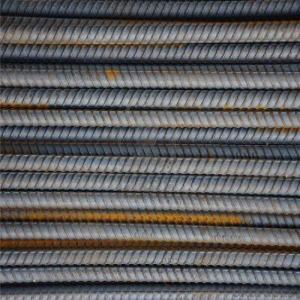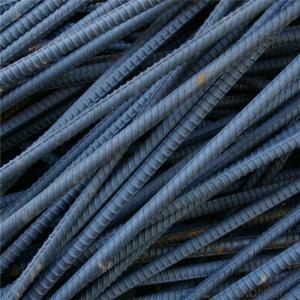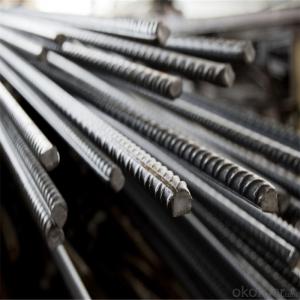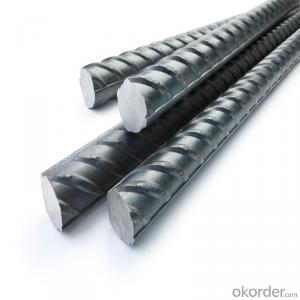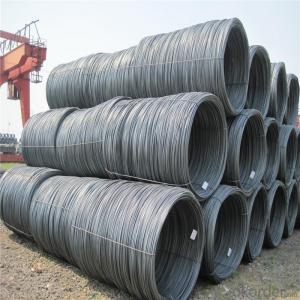Hot Rolled Galvanized Construction Deformed Twisted Steel Rebar
- Loading Port:
- Tianjin
- Payment Terms:
- TT OR LC
- Min Order Qty:
- 180 m.t.
- Supply Capability:
- 500000 m.t./month
OKorder Service Pledge
OKorder Financial Service
You Might Also Like
Item specifice
Hot Rolled Galvanized Construction Deformed Twisted Steel Rebar
Description of Hot Rolled Galvanized Construction Deformed Twisted Steel Rebar
1, Diameter: 5.5mm-10mm Reinforced Steel Bar Hrb400B
10m- 40mm Reinforced Steel Bar Hrb400B
2, Length: 6m, 9m, 12m or customized
3, Standard: GB, ASTM, AISI, SAE, DIN, JIS, EN
OEM technology - send detailed technical parameters for accurate quotation.
2, Produce Process: smelt iron - EAF smelt billet - ESR smelt billet -
hot rolled or forged to get the steel round bar and plate
3, Heat Treatment: annealing, normalizing, tempering, quenching
4, Surface Treatment: Black
5, Quality Assurance: We accept third party inspection for all orders.
You can ask testing organizations such as SGS, BV, etc. to test our products before shipping.
Chemical Composition of Hot Rolled Galvanized Construction Deformed Twisted Steel Rebar
Grade | Technical data of the original chemical composition(%) | |||||
Reinforcing steel bar HRB335 | C | Mn | Si | S | P | B |
≤0.25 | ≤1.60 | ≤0.80 | ≤0.045 | ≤0.045 | >0.0008 | |
Physics Capability | ||||||
Yield Strength(N/cm2) | Tensile Strength(N/cm2) | Elongation(%) | ||||
≥ 335 | ≥490 | ≥16 | ||||
Reinforcing steel bar HRB400 | C | Mn | Si | S | P | B |
≤0.25 | ≤0.16 | ≤0.80 | ≤0.045 | ≤0.045 | 0.04-0.12 | |
Physics Capability | ||||||
Yield Strength(N/cm2) | Tensile Strength(N/cm2) | Elongation(%) | ||||
≥ 400 | ≥ 570 | ≥ 14 | ||||
Products Show of Hot Rolled Galvanized Construction Deformed Twisted Steel Rebar
Company Information
CNBM International Corporation is the most important trading platform of CNBM group.
Whith its advantages, CNBM International are mainly concentrate on Cement, Glass, Iron and Steel, Ceramics industries and devotes herself for supplying high qulity series of refractories as well as technical consultancies and logistics solutions.


F A Q
1, Your advantages?
professional products inquiry, products knowledge train (for agents), smooth goods delivery, excellent customer solution proposale
2, Test & Certificate?
SGS test is available, customer inspection before shipping is welcome, third party inspection is no problem
3, Factory or Trading Company?
CNBM is a trading company but we have so many protocol factories and CNBM works as a trading department of these factories. Also CNBM is the holding company of many factories.
4, Payment Terms?
30% TT as deposit and 70% before delivery.
Irrevocable L/C at sight.
5, Trading Terms?
EXW, FOB, CIF, FFR, CNF
6, After-sale Service?
CNBM provides the services and support you need for every step of our cooperation. We're the business partner you can trust.
For any problem, please kindly contact us at any your convenient time.
We'll reply you in our first priority within 24 hours.
- Q:What are the different annealing techniques used for special steel?
- There are several annealing techniques used for special steel, including full annealing, spheroidizing annealing, and stress relieving annealing. Full annealing involves heating the steel to a high temperature and then slowly cooling it, which helps to refine the grain structure and reduce internal stresses. Spheroidizing annealing is used to soften the steel and improve machinability by forming spherical carbides within the microstructure. Stress relieving annealing is performed to reduce residual stresses in the steel, typically after significant machining or welding operations. These different techniques allow for the customization of special steel properties to meet specific application requirements.
- Q:What are the different methods of surface pickling for special steel?
- There are several methods of surface pickling for special steel, including acid pickling, electrolytic pickling, and mechanical pickling. Acid pickling involves immersing the steel in an acid solution to remove impurities and oxides from the surface. Electrolytic pickling uses an electric current to remove contaminants from the surface of the steel. Mechanical pickling involves using abrasive materials or mechanical force to physically remove impurities and oxides from the surface. Each method has its advantages and may be chosen based on the specific requirements of the steel and the desired outcome.
- Q:What are the different types of tool steel?
- There are several types of tool steel, including high-speed steel, cold work steel, hot work steel, and shock-resisting steel. Each type is specifically designed for different applications and has unique properties to withstand various conditions and demands. High-speed steel, for example, is known for its ability to retain hardness at high temperatures, making it suitable for cutting tools. Cold work steel is used for applications involving cutting, shearing, and forming metals at lower temperatures. Hot work steel, on the other hand, is designed to withstand high temperatures and is commonly used in die casting and forging. Lastly, shock-resisting steel is used in applications where the tool is subjected to high impact or sudden shocks, such as in chisels or hammers.
- Q:How is martensitic steel used in knife making?
- Martensitic steel is commonly used in knife making due to its excellent hardness, strength, and ability to hold a sharp edge. This type of steel undergoes a heat treatment process called quenching, which transforms its structure to be very hard and brittle. Knives made from martensitic steel are highly durable and resistant to wear and corrosion, making them ideal for various cutting tasks.
- Q:Can special steel be used in the construction equipment manufacturing industry?
- Yes, special steel can be used in the construction equipment manufacturing industry. Special steel, such as high-strength or wear-resistant steel, can provide enhanced durability and performance to construction equipment, making it suitable for demanding applications in the industry.
- Q:Can special steel be used in marine environments?
- Indeed, marine environments can benefit from the utilization of special steel. Specifically engineered to endure the harsh conditions prevalent in marine settings, special steel, such as stainless steel or marine-grade steel, proves its worth. These environments typically expose materials to saltwater, which possesses a highly corrosive nature. Nonetheless, special steel's resistance to corrosion remains intact due to its elevated levels of chromium and other alloying elements. Consequently, it becomes exceedingly suitable for an array of marine applications, encompassing shipbuilding, offshore structures, and marine equipment. The reliability of special steel lies in its exceptional strength, durability, and corrosion resistance. Moreover, to further augment its resistance to corrosion, special steel can undergo additional treatment and coating, thereby guaranteeing its longevity and optimal performance in marine conditions.
- Q:How does special steel perform in erosion applications?
- Special steel is renowned for its extraordinary performance in erosion applications, owing to its distinctive attributes such as elevated hardness, resistance to corrosion, and wear resistance, which render it exceptionally well-suited for environments where erosion is a prevalent concern. Erosion, which entails the gradual deterioration of a material due to external forces like abrasion, impact, or cavitation, can pose significant challenges in industries like mining, oil and gas, and chemical processing. In such cases, regular steel may prove inadequate in withstanding the harsh conditions and may rapidly succumb to degradation. Conversely, special steel is purposefully designed to endure erosive forces and maintain its structural integrity over an extended lifespan. Its high hardness empowers it to withstand abrasion and impede rapid material degradation, thus making it an ideal choice for applications involving the movement of abrasive materials or fluids. Moreover, special steel exhibits exceptional corrosion resistance, a vital characteristic in erosive environments. It can effectively withstand the corrosive impact of chemicals, moisture, and other harsh substances, thereby guaranteeing the material's durability and performance. Additionally, special steel offers exceptional wear resistance, which enables it to endure repeated impacts, high pressures, and sliding contact without experiencing significant damage. This quality makes it remarkably effective in erosion-prone applications, consequently minimizing downtime and maintenance expenses associated with material replacement or repair. In conclusion, the properties of special steel establish it as a dependable and long-lasting option for erosion applications. Its capacity to withstand abrasion, corrosion, and wear ensures that it can thrive in demanding conditions often encountered in such environments, ultimately delivering enduring performance and diminishing the necessity for frequent replacements.
- Q:Can special steel be used in the defense equipment manufacturing industry?
- Yes, special steel can be used in the defense equipment manufacturing industry. Special steel alloys, such as high-strength and corrosion-resistant varieties, are often utilized in the production of various defense equipment components, including armored vehicles, missiles, aircraft, and naval vessels. These specific steel types offer superior mechanical properties, durability, and resistance to extreme conditions, making them highly suitable for defense applications.
- Q:How does special steel perform under high temperatures?
- Special steel, also known as high-temperature steel, exhibits excellent performance under high temperatures. It maintains its strength, hardness, and resistance to deformation, making it suitable for various applications in extreme heat conditions. Additionally, special steel can withstand thermal stress and oxidation, ensuring its durability and reliability in high-temperature environments.
- Q:How does special steel contribute to improving product efficiency in energy-intensive processes?
- Special steel plays a crucial role in improving product efficiency in energy-intensive processes due to its unique properties. Its superior strength, durability, and heat resistance allow for the design and manufacturing of more efficient and high-performing equipment. By using special steel components, energy-intensive processes can operate at higher temperatures, withstand harsh conditions, and reduce material wear, resulting in increased productivity, reduced downtime, and ultimately, improved energy efficiency.
1. Manufacturer Overview |
|
|---|---|
| Location | |
| Year Established | |
| Annual Output Value | |
| Main Markets | |
| Company Certifications | |
2. Manufacturer Certificates |
|
|---|---|
| a) Certification Name | |
| Range | |
| Reference | |
| Validity Period | |
3. Manufacturer Capability |
|
|---|---|
| a)Trade Capacity | |
| Nearest Port | |
| Export Percentage | |
| No.of Employees in Trade Department | |
| Language Spoken: | |
| b)Factory Information | |
| Factory Size: | |
| No. of Production Lines | |
| Contract Manufacturing | |
| Product Price Range | |
Send your message to us
Hot Rolled Galvanized Construction Deformed Twisted Steel Rebar
- Loading Port:
- Tianjin
- Payment Terms:
- TT OR LC
- Min Order Qty:
- 180 m.t.
- Supply Capability:
- 500000 m.t./month
OKorder Service Pledge
OKorder Financial Service
Similar products
New products
Hot products
Related keywords
